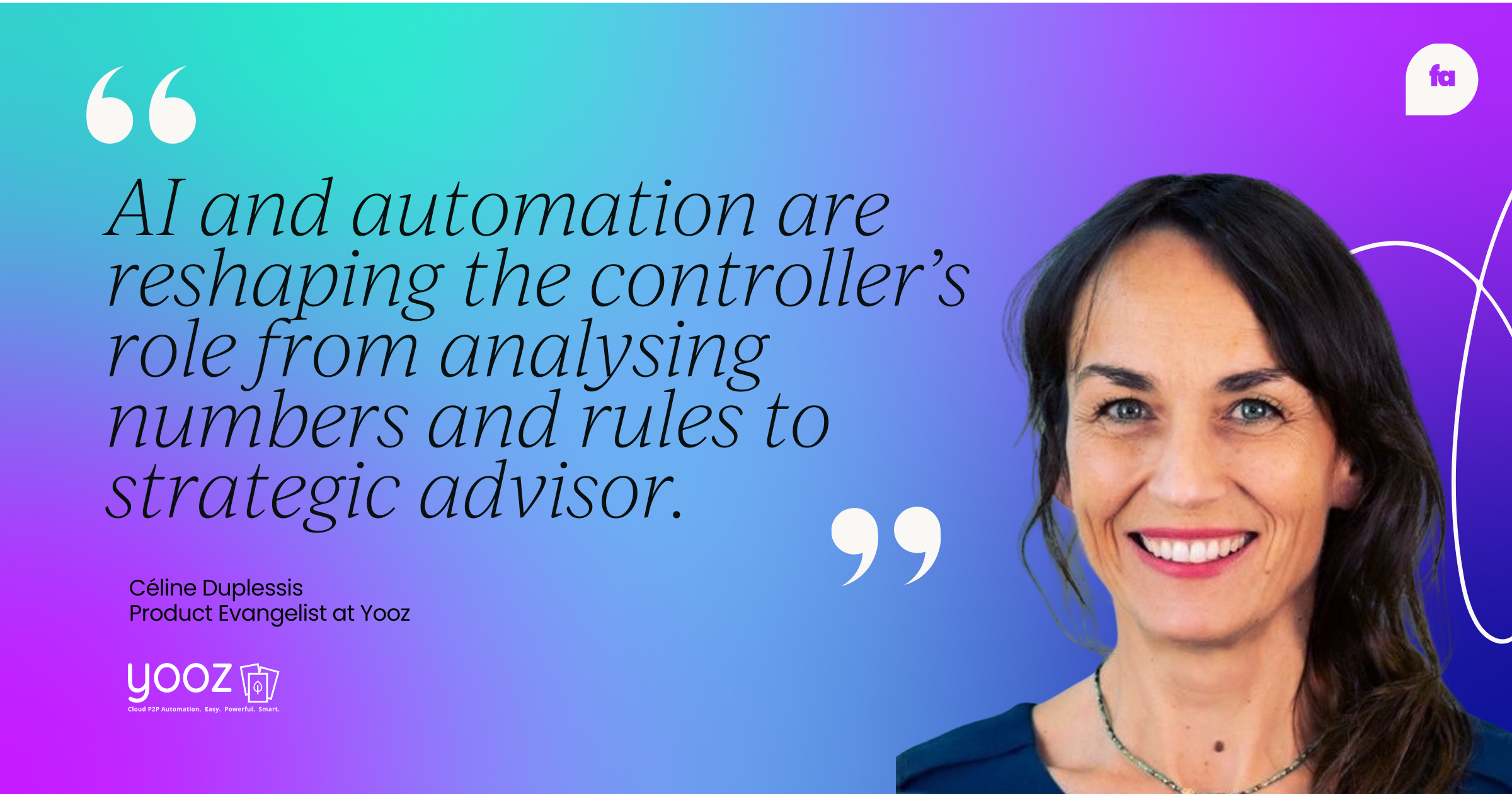
When finance teams face mounting pressure to do more with less, clarity and control have never been more critical, and Céline Duplessis is here to show how AI can make that possible.
As Product Evangelist at Yooz, Céline brings a wealth of international experience across sales, digital advertising, and marketing.
Her deep understanding of both technology and business development fuels her mission to help organizations harness intelligent automation to drive smarter, more strategic finance operations.
Céline is joining us at the Controller Summit (October 15, 2025) to lead a session that’s both timely and transformative: Boosting control & clarity: How AI is reshaping finance.
Attendees will learn how to:
- Enhance internal controls and reduce compliance risks through AI
- Improve financial visibility and reporting accuracy with automation
- Take practical steps to get started on their own digital finance journey
We caught up with Céline ahead of the event to discuss how emerging technologies are changing finance, what true financial clarity looks like in an AI-driven world, and why now is the time to lead with innovation.
What are the biggest challenges controllers face?
Controllers today face mounting pressure to adapt internal controls to increasingly complex regulatory environments and digital transformation requirements.
The proliferation of data and automation tools demands sharper oversight to ensure accuracy, consistency, and compliance.
At the same time, they must deliver real-time financial clarity to stakeholders while navigating fragmented systems and evolving business challenges.
What inspired you to talk about this topic in your upcoming session, and why do you think it’s so timely for controllers right now?
I thought that, funnily enough with AI, there is the fear of loss of control and loss of clarity with too much data, too many systems.
The goal of the session is to show the real applications of AI to the function of the financial controller.
So, the opportunity was to define AI better and its use in particular for finance teams.
How do AI and automation strengthen internal controls and reduce compliance risk for finance teams?
True, the first reason and first step in implementing AI within the finance function is usually to automate low complexity tasks, data capture and workflows.
In terms of internal controls, AI and can provide many tools: it can provide clear audit trails so that each operation is traceable, making internal reviews and audits efficient and transparent.
Another application is within automated checks and validations. Here, AI can review transactions, journal entries and thus minimise errors.
Finally, AI can ensure segregations of duties by helping maintain clear role separation and identifying potential conflicts in access or responsibilities.
In terms of reducing compliance risks, AI can provide real time monitoring and detection of anomalies or participate in fraud detection by detecting suspicious behavior or unusual transactions.
How can automation help finance leaders move from fragmented data to a real-time “single source of truth”?
Automation streamlines data integration across disparate systems, reducing manual errors and enabling consistent, real-time reporting.
This empowers finance leaders to make faster, more confident decisions based on a unified and trustworthy data foundation.
How does the adoption of AI and automation impact the skill sets controllers and their teams need to succeed in the future?
AI and automation are reshaping the controller’s role from analysing numbers and rules to strategic advisor.
Teams now need stronger understanding of data and tech, and the ability to interpret insights.
It’s less about a reactive role and more about a proactive one, supporting faster and better decision making.
How can technology free up time and capacity for controllers to focus more on strategic decision-making?
That's an easy one.
By automating tasks like manual data entry, data capture, streamlining communication (but providing pre-checks ahead) AI and automation free teams from less strategic tasks and then can now use this time to focus on analysis and decision making.
What are some common misconceptions about AI in finance that you encounter?
First, there is the apprehension that AI will be difficult to implement on your current systems, and that your teams will take time to adopt it.
That's not what we've seem. Solutions like Yooz for accounts payable are rapidly adopted by teams (and liked), as it makes their job easier and more qualitative.
Sometimes we also encounter myths around issues with data security. But, if you make sure that the tool you are using is abiding by the latest security protocols, you end up protecting your business.
Finally, there is a fear that AI will ultimately replace certain roles. That's not the case; there is a limit to what AI can replicate or interpret or create. AI is a helper but should always be used with an expert and not alone.

How is AI being used to proactively identify and prevent Cybersecurity and fraud risks?
Fraud is a big concern for businesses today, and there are many types of fraud. AI can be used in different ways here.
If we take the example of accounts payable, there are mainly two ways in which AI can help with Fraud prevention.
One, AI will check that the data matches in all documents so, if there is a mismatch anywhere, it will notify you.
And then, for Yooz, we also use big data. I'll give you an example: If you receive an invoice from a supplier that has banking details which do not match our current big data (Yooz has processed over 300 million invoices over time), our system will raise an alert.
For controllers who are just starting to explore AI-driven automation, what practical first steps would you recommend?
We would recommend them to act gradually (take small steps first).
An Accounts Payable Automation is an easy first step within the finance department.
Looking ahead, how do you see AI and automation reshaping the controller role over the next few years?
The controller's role will change in the next 5 years with a greater emphasis needed on technology literacy and data interpretation.
Today, all businesses are looking into digitising their finance function to increase productivity and stay competitive, but also to face the different challenges of increasing regulations and requirements for transparency.
I believe that the expertise will need to shift from an analytic standpoint to a proactive standpoint: being able to anticipate and navigate a world where the cycles are required to become shorter and shorter.
Finally, if attendees walk away from your session with just one insight or action item, what do you hope it will be?
That AI is reshaping the finance function and that there are actionable steps that need to happen for business to make a successful use of it.
Finance is changing fast. Are you ready to lead the change?
The Controller Summit is a free event where forward-thinking finance professionals come together to gain actionable insights from the best in the business and uncover strategies that actually work for controllers.
📅 When: 15 October, 2025
🗺 Where: Virtual
Whether you’re looking to strengthen governance, boost financial visibility, or unlock smarter, data-driven decision-making, this is where your next chapter begins.
Grab your ticket today to join Céline Duplessis and other industry leaders at the Controller Summit and be part of the future of finance.



 Follow us on LinkedIn
Follow us on LinkedIn



